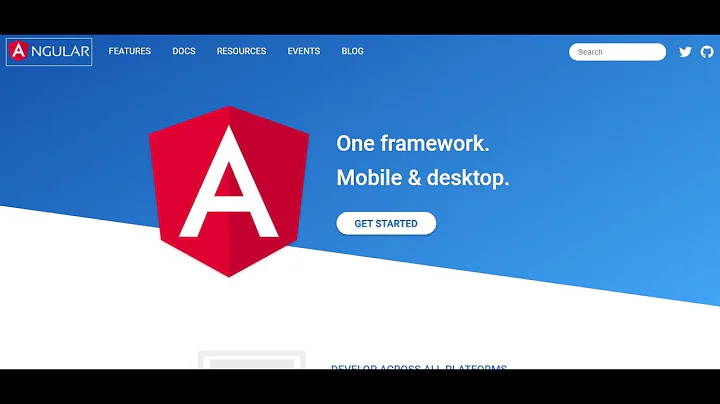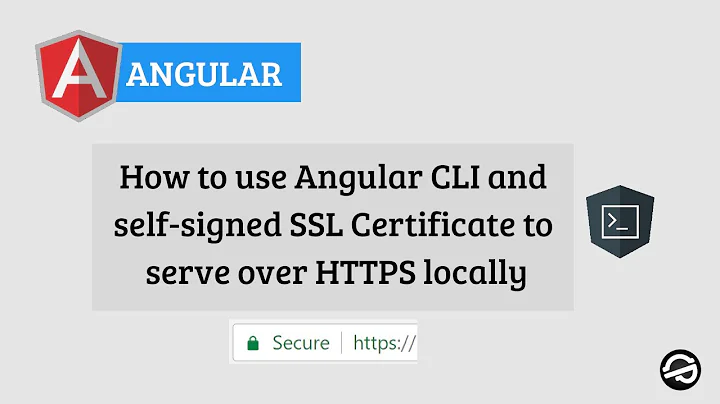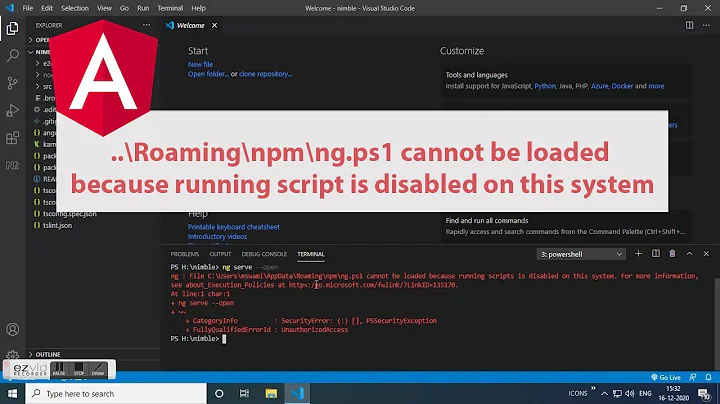Get angular-cli to ng serve over HTTPS
Solution 1
Angular CLI 6+
I've updated my own projects so I figured I can now update this answer too.
You'll now put the path to your key and certificate in your angular.json file as follows:
{
"$schema": "./node_modules/@angular/cli/lib/config/schema.json",
"projects": {
"<PROJECT-NAME>": {
"architect": {
"serve: {
"options": {
"sslKey": "<relative path from angular.json>/server.key",
"sslCert": "<relative path from angular.json>/server.crt",
...
}, ...
}, ...
}, ...
}, ...
}, ...
}
And then you can run:
ng serve --ssl
If you want SSL on by default then you should add a "ssl": true, option immediately below the sslKey and sslCert.
You can find the angular.json schema at the Angular CLI documentation.
Old answer for Angular CLI 1.0.0+.
Angular-CLI now works with the SSL options. Like you've noted, you can manually select which key and cert you'd like to use with the command:
ng serve --ssl --ssl-key <key-path> --ssl-cert <cert-path>
If you'd like to set a default path for your key and cert then you can go into your .angular-cli.json file adjust the Defaults section accordingly:
{
"$schema": "./node_modules/@angular/cli/lib/config/schema.json",
"defaults": {
"serve": {
"sslKey": "<relative path from .angular-cli.json>/server.key",
"sslCert": "<relative path from .angular-cli.json>/server.crt",
...
}, ...
}, ...
}
And then you can run:
ng serve --ssl
If you want SSL on by default then you should add a "ssl": true, option immediately below the sslKey and sslCert.
Solution 2
You can use
--ssl
or
"serve": {
"builder": "@angular-devkit/build-angular:dev-server",
"options": {
"browserTarget": "someapp:build",
"ssl": true
},
and an ssl cert will automatically be generated for you.
Then for Chrome to accept a self signed cert for localhost, set this flag: chrome://flags/#allow-insecure-localhost
You'll also need to import the cert into your Trusted Root Certificates. To do this, click the cert error at top in Chrome then:
- Click
certificate (invalid) - Click the
Detailstab - Click
Copy to File... - next next finish and export it somewhere.
- start-> run->
inetcpl.cpl - click
Contenttab - click
Certificates - click
Trusted Root Certication Authoritiestab - Click
Importbutton - Import the cert
- Re-run
ng serve --ssl
Be aware, the cert only lasts one month. At the end of that month you'll struggle to find a solution but I've already been through this and here is the fix
Solution 3
JFYI, in Angular6 you have to put the conf in the options (in angular.json) :
"serve": {
"builder": "@angular-devkit/build-angular:dev-server",
"options": {
"browserTarget": "app:build",
"ssl": true,
"sslKey": "path to .key",
"sslCert": "path to .crt"
},
...
}
Solution 4
Very simple solution from this page
npm install browser-sync --save-dev
And then
ng serve --ssl true --ssl-key /node_modules/browser-sync/lib/server/certs/server.key --ssl-cert /node_modules/browser-sync/lib/server/certs/server.crt
Quick and bold) Just used it in my angular cli 6.2.3 project
Solution 5
If you don't want to go for configurations just add --ssl
ng serve --ssl
Perfectly working, it will automatically create a certificate for you. Tested on chrome browser. It says "not trusted connection", but just proceed.
Hope this helps
Related videos on Youtube
grim_i_am
Updated on May 10, 2022Comments
-
grim_i_am almost 2 years
The following doesn't seem to do anything.
ng serve --ssl true --ssl-key <key-path> --ssl-cert <cert-path>
Creating the Certificate and key by providing them in the default ssl directory still does nothing.
It looks like
ng serveris completely ignoring the--sslparameter and keeps sayingNG Live Development Server is running on http://localhost:4200.-
Andreas over 6 yearstry ng serve --ssl 1 --ssl-key "ssl/local.brianflove.com.key" --ssl-cert "ssl/local.brianflove.com.crt"
-
-
 Jason Yost over 7 yearsThis does not provide an answer to the question. Once you have sufficient reputation you will be able to comment on any post; instead, provide answers that don't require clarification from the asker. - From Review
Jason Yost over 7 yearsThis does not provide an answer to the question. Once you have sufficient reputation you will be able to comment on any post; instead, provide answers that don't require clarification from the asker. - From Review -
 Stefan Baramov over 7 yearsThe latest version of angular-cli fixes the issue. So to fix the issue all you have to do is upgrade to latest angular-cli
Stefan Baramov over 7 yearsThe latest version of angular-cli fixes the issue. So to fix the issue all you have to do is upgrade to latest angular-cli -
JustRandom almost 6 years"ssl" : "true" will start ssl by default
-
Mahi almost 6 years@Dominik, where to write "ssl" : "true" . Can you tell me either in ng serve command or in angular-cli.json. Thank you
-
Taul almost 6 years@Ahmadmnzr It would be another key-value pair inside the serve object. So it would go on the line beneath "sslCert": "<relative path from .angular-cli.json>/server.crt".
-
 Satish Patro about 5 yearsYou should first explain, then give link. The recommneded way. If link go down. You will only get downvote and people will not get the knowledge
Satish Patro about 5 yearsYou should first explain, then give link. The recommneded way. If link go down. You will only get downvote and people will not get the knowledge -
James Hancock over 4 yearsFYI, this still works great in the angular.json file but the paths have changed: "ssl": true, "sslKey": "/node_modules/browser-sync/certs/server.key", "sslCert": "/node_modules/browser-sync/certs/server.crt",
-
 Post Impatica over 3 yearsBe aware, this cert only lasts one month. When it expires you'll be running around all over the place looking for a fix. I battled this so keep this link
Post Impatica over 3 yearsBe aware, this cert only lasts one month. When it expires you'll be running around all over the place looking for a fix. I battled this so keep this link -
Brian Bobek over 3 yearsWith --ssl on a Mac I also needed to leave the --port flag off and run ng serve as an admin. sudo ng serve --ssl --host localdeveloper.whatever.com. Getting localdeveloper.whatever.com to resolve on a mac (meaning an additional localhost hosts file entry) requires aliasing, a topic for another s.o. question.
-
 ChinaHelloWorld almost 3 yearsAs for latest angular: 12.0.5, node:v14.17.1, browser-sync: ^2.26.14, command update as following: ng serve --ssl true --ssl-key ./node_modules/browser-sync/certs/server.key --ssl-cert ./node_modules/browser-sync/certs/server.crt
ChinaHelloWorld almost 3 yearsAs for latest angular: 12.0.5, node:v14.17.1, browser-sync: ^2.26.14, command update as following: ng serve --ssl true --ssl-key ./node_modules/browser-sync/certs/server.key --ssl-cert ./node_modules/browser-sync/certs/server.crt -
 Anh-Thi DINH over 2 yearsIt doesn't work. We have to "accept le risk" and https is always in red!
Anh-Thi DINH over 2 yearsIt doesn't work. We have to "accept le risk" and https is always in red! -
 Abdullah Tahan about 2 yearsremove cash if didn't work
Abdullah Tahan about 2 yearsremove cash if didn't work -
Heike about 2 yearsThe code snippet that needs to be updated is in the
angular.jsonfile of your project. Hope this will help a lot of new angular developers.







